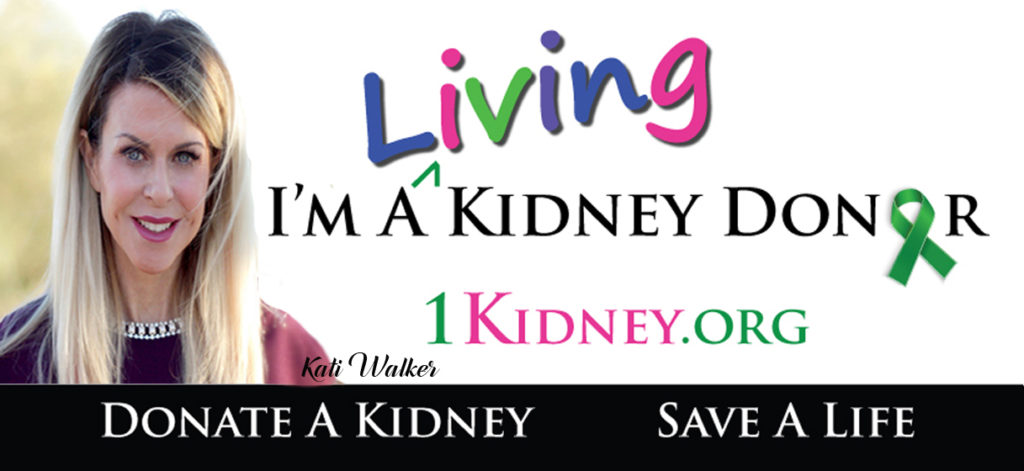LIVING KIDNEY DONORS ARE LIFE-GIFTER'S
Are You Contemplating Living Kidney Donation? Curious to Learn More?
You've Come to The Right Place!
Meet Kati Walker. Kati is a living kidney donor who doesn't wear a Superwomen's cape or badge of courage, though she surely holds one deep in her heart. Like many of you, Kati's an ordinary person (though we think she’s pretty darn special). What sets Kati apart from the crowd was her decision to selflessly donate one of her two kidneys to someone in need.
Kati wasn't planning on becoming a living organ donor, though after she learned of a person in need, she didn't hesitate to get tested. That person was Nancy, the Principal of her children's elementary school. Despite the fact that Kati and Nancy were unrelated and several years apart, their tests revealed amazing compatibility. No doubt all those blood-compatibility tests (and the success of their surgeries) was what transcended their experiences into a lifetime bond, full of love, joy and gratitude.
As a living kidney donor, Kati not only improved and extended Nancy's life, her donation also gives hope to all kidney patients facing this urgent need. Currently, nearly 100,000 people are waiting for a kidney in the United States and their life-threatening wait for a kidney (from a deceased organ donor) can be 3, 5, 7 or as much as 9-plus years. Those in need today cannot afford to wait that long. On average, 13 people waiting die before their name gets to the top of the list. Many others lose their transplant eligibility due to advanced illness while waiting. This is what makes living kidney donation so extraordinarily heroic, life-saving and powerful.
Have you ever had the privilege to meet these humble heroes? Since they don't wear a Medal of Honor or a superhero's cape - or even a small badge of courage, it’s hard to recognize them. Though living kidney donors don't look for recognition and never claim to be heroes, they surely deserve our applause and heartfelt gratitude, so let’s all be sure to thank them for their life-saving service when they cross our paths.
Witness the Miracle
Because living kidney donors choose to donate one of their kidneys during their lifetime, they get to witness the miracle of their gift and sense immense pride for their accomplishment. *Living kidney donors retain their right to donate their remaining organs later in life as well.
Have you ever imagined what it would be like to save someone's life or extend the quality of someone's remaining years- while you are still alive? Living kidney donors can transform this thought into a reality.
Hidden Organ Donor Facts:
The Need: Nearly 100,000 end-stage kidney disease patients are in desperate need of a replacement kidney.
The Wait: It can take 3 to 9-plus years to receive a kidney from a deceased organ donor . Living Kidney Donation can end the wait.
The Benefit: Kidney transplants offer a far better alternative to dialysis. The benefits include, a better quality-of-life, fewer medical complications and longer survival rates.
Are You A Match? Living kidney donors don't have to be blood-related to the recipient. They only need to be blood-type compatible. But even then, there are Paired Exchange Programs that can offer alternatives. Get a head start by asking your doctor for a blood-type (ABO) test.
The Opportunity: Healthy individuals can donate a kidney while they are still living and continue to live a full life. In other words, kidney donors don't have to wait until after they've passed to donate. They do, however, need to pass the transplant center's donor qualification process in order to proceed. Contact the person-in-need's transplant center, or a transplant center near you to learn more.
Who Can Donate? Most people in good health between the ages of 18-65 can be considered. The qualification process typically begins with a online application or telephone screening to determine if a testing can follow.
Testing: The evaluation typically includes several interviews, exams, scans and lab tests. The transplant center requires these tests to ensure the person who wishes to donate is healthy enough to do so. All donor conversations are handled in strict confidence to ensure callers can ask
questions without pressure or concern. The recipient will never know someone called in or their donor's status, unless the donor tells them directly.
The Surgery: The surgery is performed with small incisions, which is known as a laparoscopic surgery. In kidney donation (also known as a nephrectomy), the procedure typically involves four 1 inch incisions in the area of the stomach and bladder. There is also one four inch incision made around the navel. This incision is a bit larger so the kidney can be removed from this area.
Risks: The surgical process for removing a kidney from a healthy individual has become a fairly standard procedure. Nonetheless, the procedure still carries the same level of risk as any other major surgery. The most common risks associated with kidney donation includes blood clotting, infection and a reaction to the anesthesia. The risk of death from donating a kidney is less than one percent, or 0.0003 % (which is about 3 in every 10,000 surgeries).
Hospital Stay & Recovery: Hospital recovery usually involves 1-3 overnight stays. Discharge is determined by the donor’s health and their ability to get out of bed and walk on their own. Although the donor will feel pain after surgery, pain medications will be provided to help patient comfort. It is not uncommon for some patients to experience constipation from pain medication, though there are ways to minimize issues.
Work & Activities: Most living kidney donors can resume their regular activities within 3 weeks after donation. Depending on the type of work they perform, they can often go back to work within 3-5 weeks. If the donor’s work is office work, they can often get back to work even sooner. Those engaged in more strenuous activities are advised to refrain from these types of tasks until they are completely recovered.
Can a Donor Still Live a Normal Life After Surgery? There are many studies showing living kidney donors doing quite well after they donate a kidney. For the most part, their health and quality of life remains unchanged. The most notable change expressed by most living kidney donors comes in the form of the perpetual joy they feel for achieving such an extraordinary triumph.
The Costs? The transplant recipient's medical insurance will cover the kidney donor’s medical costs. Things that are not covered or paid for by the transplant patient’s insurance company include the donor’s time off from work, care-giver costs and applicable travel and lodging expenses. [There are a few states that now require employers to cover living kidney donor’s time off work for a set period of time. Be sure to ask your employer to prevent incorrect assumptions]. For those who may be concerned that they may lose their job for taking time off work, refer to the Family Medical Leave Act which now recognizes job protections for living organ donors.
Learn As Much As You Can: There's a lot to learn, discover and discuss with friends and family when it comes to living kidney donation. Download this PDF to learn more: Top Twelve Questions on Living Kidney Donation.
The VIDEO LINK below provides an informative Family & Friends overview regarding the opportunity and value of Living Kidney Donation (LKD).
Watch Now: Family & Friends Learn More Here
Who Will You Help? Do you have a specific person in mind? If so, contact that person's transplant center (the transplant hospital where the patient is registered) to express your interest and request an evaluation. If you don't know someone in need, simply contact a transplant center in your area (i.e.; hospitals that perform kidney transplants) to initiate a conversation about helping one of their patients in need.
*If you're a patient in need and would like to share your story to increase awareness and potential interest, check out the pearls inside this powerful book, "In Pursuit of a Better Life: The Ultimate Guide for Finding Living Kidney Donors."
What’s In It For You? While there are no trophies or medals, parties or parades or suitcases of money; there’s a lot to be said about the perpetual joy that comes through the act of giving another person a second chance to live a better life. In addition to helping reduce our country's kidney shortage, living kidney donors say that their reward is being able to witness how their kidney donation led to someone's “Life-Gain.” They often describe their experience as one of their most profound achievements they ever imagined possible. They've also been known to say that they'd do it again, if they had a third kidney.
Key Benefits to Receiving a Transplant from a Living Donor:
1. Ends The Wait: A kidney from a living donor ends the 3-9 + year wait for someone in need of a kidney transplant. The surgery can also be scheduled at the donor’s convenience when the kidney patient needs it most—and before their health declines, so they are not at risk for losing transplant eligibility.
2. Offers a Better Match: Living kidney donors are thoroughly tested to ensure the best match for their recipients. Donor testing also minimizes potential risks for both the living kidney donor and the recipient.
3. Offers Better Function: Kidneys from living donors are known to function immediately after transplant. They can also last twice as long as a kidney from a deceased donor. This could potentially equate into an additional 10-12 + years of function.
4. Presents an Opportunity to Bypass Dialysis: Most kidney patients need to be on dialysis (to stay alive) while they wait for a deceased donor’s kidney. Living kidney donors allow end-stage kidney disease patients to bypass* the need for dialysis (or end their need for dialysis) by getting a transplant within 3-6 months after approval.
Support the Cause: For those who wish to support the cause by supporting increased awareness, a tax deductible contribution is greatly appreciated: www.transplantfirst.org/go/contribute
*TransplantFirst Academy is a 501c3 non-profit organization.
Sign Up & Receive Immediate PDF Download:
Top 12 “Need-To-Knows” on Living Kidney Donation


